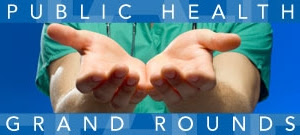
Join us today for the March session of CDC Public Health Grand Rounds, “Addressing Preparedness Challenges for Children in Public Health Emergencies.” This session will be available via live webcast from CDC headquarters in Atlanta, Georgia on Tuesday, February 17, at 1 p.m. (EDT) at http://www.cdc.gov/
Public health emergencies can happen at any time, anywhere. Natural disasters, epidemics, and terrorist attacks that have occurred in recent years have underscored the importance of local, state, and federal public health systems in preparing for potential health threats. Public health emergencies, such as Hurricane Katrina, the 2009 H1N1 influenza pandemic, and 9/11 have shown that children have different needs than adults, and require special attention, such as pediatric-focused care. However, responses to past events also show that the unique needs of children have not been adequately addressed in the planning process.
Incorporating the needs of children into emergency preparedness planning is critical. A child’s age and size may require the use of different medications or equipment for medical care, but availability of these pediatric resources is often limited. Clinicians accustomed to performing certain procedures on adults often do not feel comfortable performing these same procedures on a child – posing dilemmas for individual responders during times of emergency.
This session of Grand Rounds will discuss strategies to address the unique vulnerabilities of children in every stage of emergency planning. Presenters will also highlight the strong progress that has been made in pediatric disaster readiness as well as the collaboration that is still needed between public health professionals and pediatric care providers to improve the outcomes for children during emergencies.
Future Grand Rounds topics include “Prevention and Control of Skin Cancer” and “Dengue and Chikungunya In Our Backyard: Preventing and Controlling Mosquito-Borne Viruses.”
Email your questions about this topic before or during the session. Follow us on Twitter #cdcgrandrounds
Presented By:
Georgina Peacock, MD, MPH
Director, Division of Human Development and Disability
National Center on Birth Defects and Developmental Disabilities, CDC
“Meeting the Needs of Children in Public Health Disasters”
Michael R. Anderson, MD, MBA
Chief Medical Officer, University Hospitals
Associate Professor, Department of Pediatrics
Case Western Reserve University School of Medicine
“Preparing Hospitals to Provide Pediatric Care during Disasters”
Esther Chernak, MD, MPH
Director, Center for Public Health Readiness and Communication
Associate Research Professor, Department of Environmental and Occupational Health
Drexel University School of Public Health
“Integrating Community Pediatric Practices into Disaster Preparedness”
Nicole Lurie, MD, MSPH
Rear Admiral, U. S. Public Health Service
Assistant Secretary for Preparedness and Response
U. S. Department of Health and Human Services
“Strengthening Resilience in Pediatric and At-Risk Populations”
Facilitated By:
John Iskander, MD, MPH, Scientific Director, Public Health Grand Rounds
Phoebe Thorpe, MD, MPH, Deputy Scientific Director, Public Health Grand Rounds
Susan Laird, MSN, RN, Communications Director, Public Health Grand Rounds
For non-CDC staff or those outside of the CDC firewall:
A live external webcast will be available. Presentations are archived and posted 48 hours after each session. Due to security measures at CDC’s Roybal campus, non-CDC staff who wish to attend these sessions in person must have prior clearance and a U.S. state-issued photo ID (e.g., driver’s license, US passport).
Names of non-CDC staff (both domestic and international) should be submitted to the Grand Rounds Team. Please note that all information for international visitors must be submitted at least 10 days in advance.
Grand Rounds is available for Continuing Education.
ALL Continuing Education hours for Public Health Grand Rounds (PHGR) are issued online through theCDC/ATSDR Training and Continuing Education Online system. If you have questions, e-mail or call Learner Support at 1-800-418-7246 (1-800-41TRAIN).
Those who attend PHGR either in person, Envision, IPTV, or “web on demand” and who wish to receive continuing education must complete the online seminar evaluation. Thirty days from the initial seminar the course number will change to WD2346 and will be available for continuing education until February 18, 2016. The course code for PHGR is PHGR10.
Target Audience: Physicians, nurses, epidemiologists, pharmacists, veterinarians, certified health education specialists, laboratorians, others
Objectives:
1. List key measures of burden of disease involving morbidity, mortality, and/or cost.
2. Describe evidence-based preventive interventions and the status of their implementations.
3. Identify one key prevention science research gap.
4. Name one key indicator by which progress and meeting prevention goals is measured.
CE certificates can be printed from your computer immediately upon completion of your online evaluation. A cumulative transcript of all CDC/ATSDR CE’s obtained through the TCE Online System will be maintained for each user. We hope that this will assist CDC staff and other public health professionals to fulfill the requirements for their professional licenses and certificates.





















.png)









No hay comentarios:
Publicar un comentario